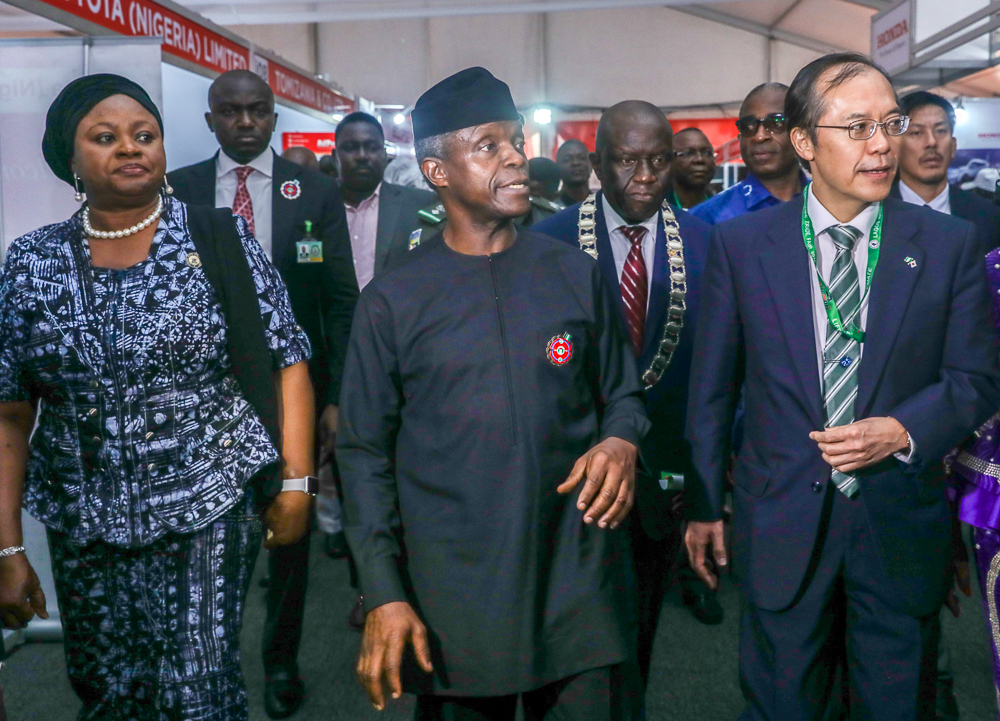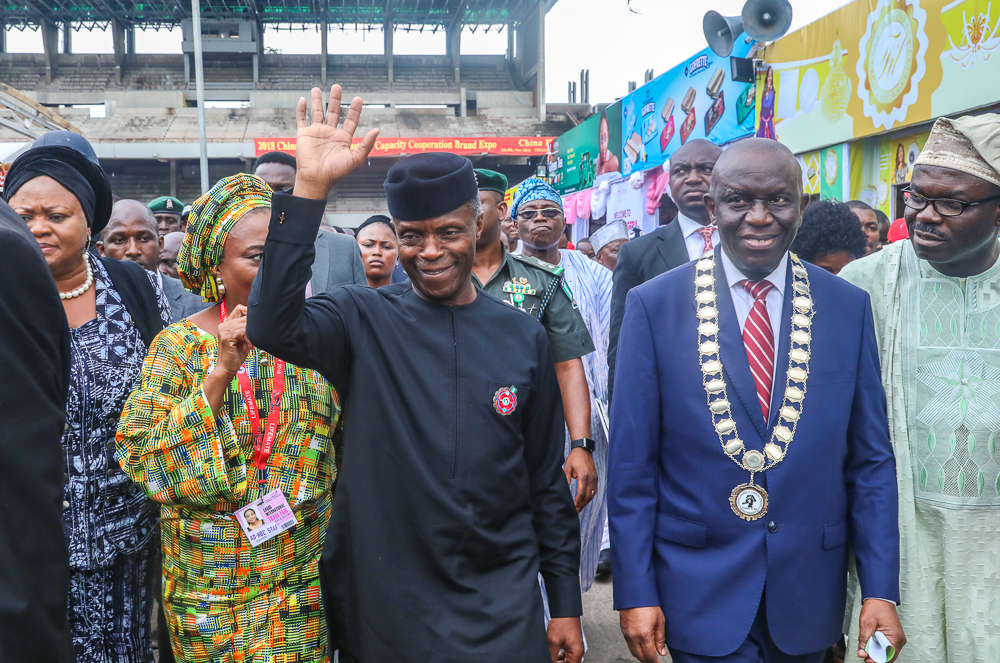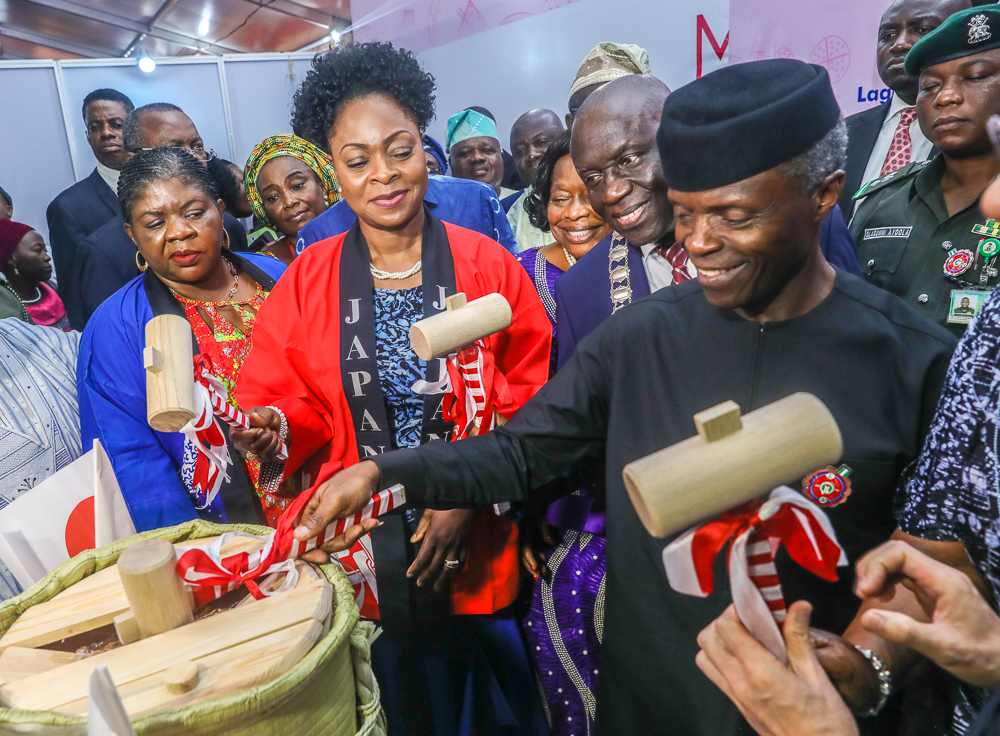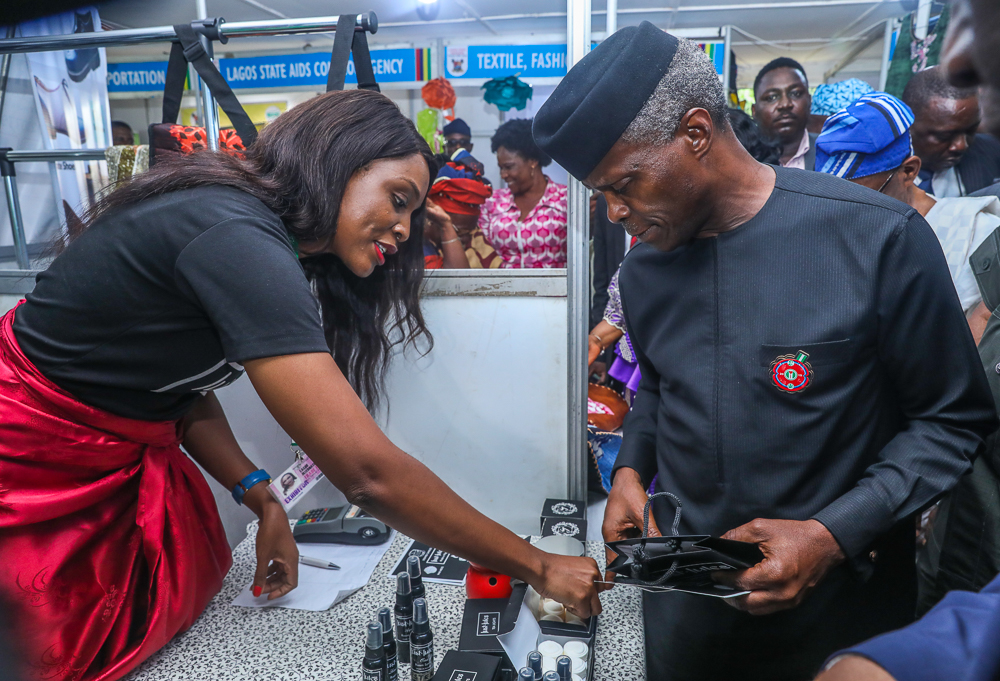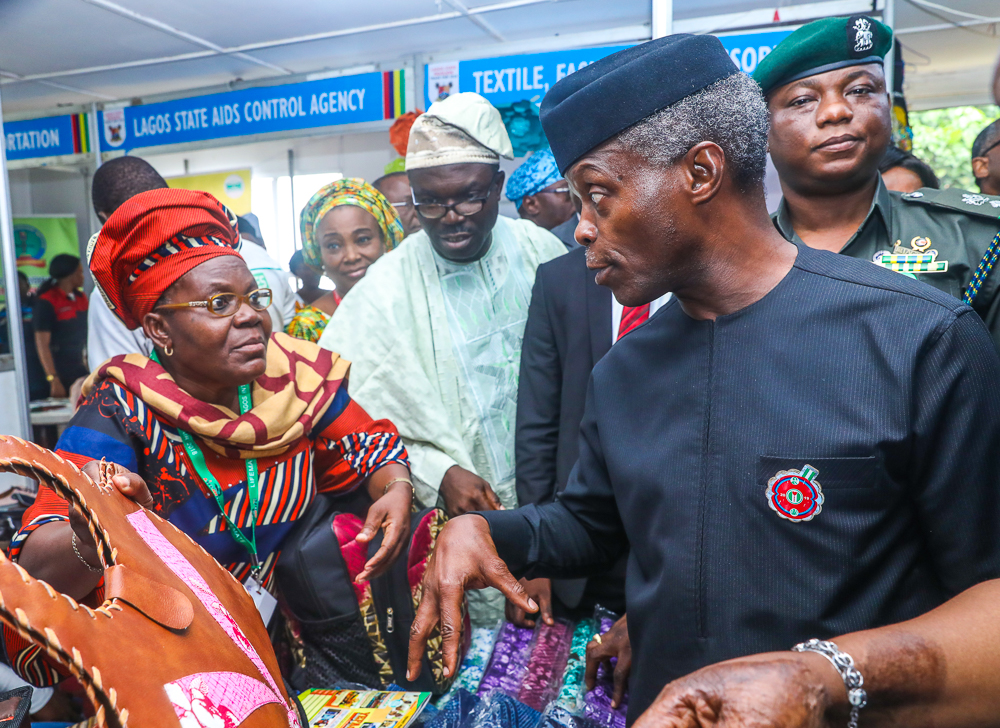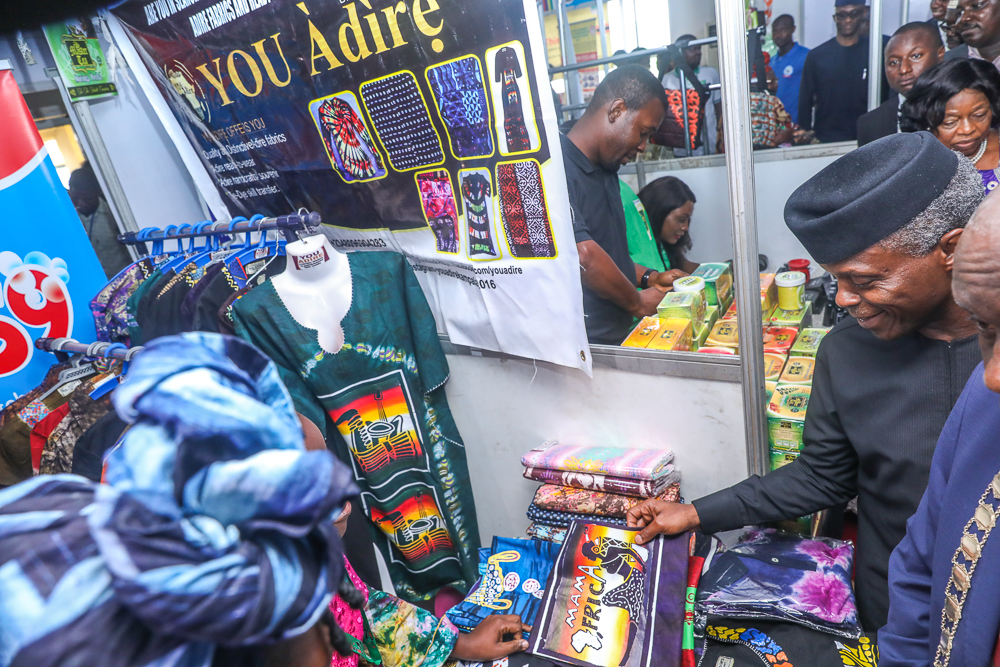Keynote Address At The Opening Of The Lagos International Trade Fair
FG COMMITTED TO POLICIES AND REFORM EFFORTS GEARED AT DIVERSIFICATION OF ECONOMY
KEYNOTE ADDRESS BY HIS EXCELLENCY, PROF. YEMI OSINBAJO, SAN, VICE PRESIDENT OF THE FEDERAL REPUBLIC OF NIGERIA, AT THE OPENING OF THE LAGOS INTERNATIONAL TRADE FAIR, IN LAGOS, NOVEMBER 2ND, 2018
PROTOCOLS.
It is my pleasure to be here with you this morning and I bring you warm greetings from His Excellency, President Muhammadu Buhari GCFR, who has asked me to represent him at this ceremony.
Although I have attended the International Trade Fair a good number of times, having lived and served in Lagos for all my life except now that I live in Abuja, I must confess anytime I am given an assignment in Lagos, I am very willing to accept. This is also a good assignment because it would mean that I might score a few good points with my wife, who had already said to me that going to the Trade Fair, there would be nice Christmas shopping done and also getting it at such huge discounts here at the Lagos International Trade Fair
So on behalf of the President (and my wife), I want to commend the leadership of the prestigious Lagos Chamber of Commerce and Industry, Mr. Babatunde Ruwase, the President LCCI; Mr. Muda Yusuf the Director General, Mr. Gabriel Idahosa the Chairman of the Trade Promotion Board, for organizing what has become the leading forum for trade and business promotion in Nigeria in the past 32 years.
I am told that this edition of the Trade Fair is hosting over 200 foreign exhibitors from several countries across the world and it is estimated that over 500,000 visitors will attend in the 10-days of the fair.
I must, therefore, welcome our guests from all over the world – (from Republic of Benin, Cameroun, China, Egypt, the European Union, Ghana, India, Indonesia, Jamaica, Japan, Jordan, Kenya, Pakistan, Singapore, South Africa, Turkey), welcome to Nigeria, the largest market in Africa!
No less important are the Nigerian businesses here at this Fair, from our large enterprises to our Micro, Small and Medium Scale Enterprises (MSMEs), resiliently driving Nigeria’s economic growth, by contributing just under 50% of the gross domestic product and employing over 80% of the country’s labour force.
The convergence of such business enterprise, investment and trade all in one place, is what makes the Lagos International Trade Fair a must attend.
The Fair creates opportunities for local and foreign investments; with a brand promise of Connecting Businesses and Creating Value for the over 5,000 businesses, I am told have registered to exhibit at the Fair.
Federal Government and Lagos State Government (which has been a very worthy partner to all of the economic efforts of the Federal Government) have been consistently committed to policies and reform efforts geared at enhancing diversification and structural reform of the economy, through massive investment in infrastructure and human capital.
These policies have successfully enhanced productivity, increased the share of manufacturing in Nigeria’s total export earnings and a drastic reduction in susceptibilities to shocks that our economy had been frequently exposed, to on account of commodity volatility which we face constantly.
Our focus on infrastructure extends to both hard and soft infrastructure, particularly trade facilitation, quality infrastructure and the Ease of Doing Business Reforms.
We have taken on the key infrastructure challenges that have stifled SME growth and development in the country, by seeking innovative ways to bridge the significant infrastructure gap and at the same time, creating an enabling environment in which it is easier to do business.
Since 2016, in two budget cycles, we have spent N2.7trillion in capital and mostly on infrastructure and this is the largest capital spend in our nation’s history, despite the fact that the country has earned 60% less than in the previous last 5 years. We focused on roads, power and on a new national rail network, among others. The Lagos-Kano rail which starts from the Lagos Port, is an important infrastructure for us, because once the Lagos-Ibadan end of it is completed by the end of the year, particularly because it starts from the ports, it will greatly relieve our roads from a lot of the trucks that go from point to point, out to the West of Nigeria and to the farthest part of Nigeria.
We have also looked at power and amongst other things, we have tried to ramp up power generation; power generation has gone up to 7, 000MW from 3,000 MW in 2015.
One of the most important things about power is that using our national grid as we have been doing, it is impossible for us to certify the power needs. That is why under our Eligible Customer Declaration, we have now decided that individual power companies can supply power, for example, by what we call the Energizing Economies Initiative, being implemented by Rural Electrification Agency (REA) to provide clean, stable and affordable electricity to Nigerians in various economic clusters and markets. Today as we speak, thousands of shops in Sabon Gari in Kano State, Ariaria market in Aba, Isinkan market in Akure, Ondo State, Edaiken market in Benin, Edo State, and just last week, the Sura market in Lagos, have been provided solar power through the initiative.
It is important to emphasize why this is impactful because, in the past, we had to rely on the national grid, the DisCos and the GenCos who currently carry and generate our power. Now private companies are providing their own power through IPP agreements endorsed by the Federal Government so that they provide power independently to industries and even for domestic use in homes around the country.
We expect that this new approach will drastically reduce the problems we have at the moment with power supply.
All these markets are now connected to hundreds of megawatts of independent mini-grids, which creates value by allowing longer hours of doing business, quality storage or preservation of goods, reduced fuel expenses on fuel supply, and so on.
We are also currently facilitating an innovative product being rolled out by Google Inc., the world’s leading provider of internet search services, and some leading Nigerian private internet service providers (ISPs), to provide free, fast and high-quality public Wi-Fi platforms known as Google Stations (gStations) across Nigeria.
Earlier on this year, I took a team to Silicon Valley in America; we visited Google and one of the key achievements of that visit was the Google Stations. This was done in India where all Indian railway stations have free Wifi. So we asked them to provide free WiFi in public places as well. They are already in six locations in Lagos, namely the Palms Shopping Mall, Landmark Centre, University of Lagos, MM2 Domestic Airport, Computer Village and Ikeja City Mall.
We are currently asking them to roll out gStations in markets across Nigeria, so in the next few months they will be in Onitsha Main Market, Gbagi Market (Ibadan), Kuto Market (Abeokuta), Ariaria Market (Aba), Wuse Market (Abuja), Kaduna Central Market, Sura Market and Lagos and Abuja International Airports by the end of the year.
We think that by democratizing access to the Internet in this way, especially in public places and the markets, so many people can do their business, and more people can receive information and it can be cheaply delivered to them.
Furthermore, building an enabling business environment is a crucial plank of our economic policy. It is pivotal for the enhancement efficiency and fostering transparency.
I am certain some of our guests today benefitted from our enhanced electronic visa process, which allows any eligible business traveller coming into Nigeria, to attain a pre-approved visa within 48hrs of applying and meeting the conditions. This is in addition to the renewed mandate of a 48-hour visa processing timeline across all our missions abroad.
We have also been working closely with the MDAs to deliver on business reforms that cut across multiple processes from business incorporation, to the payment of taxes, property registration, obtaining construction permits and licenses, getting credit from financial institutions all the way to business insolvency and corporate rescue.
Business owners can now incorporate companies through the online company registration portal, within 24 hours. In a bid to encourage more micro and small enterprises to join the formal sector, the CAC is running a special 90-day window, where business name registrations have been heavily discounted at N5,000, but this offer will end on Dec 31, 2018.
The FIRS have also simplified tax payments and remittance, through the e-filing system. Importers and exporters are also not left out, as the documentation required for both imports and exports have been significantly reduced from 14 to 8 and 10 to 7 respectively. We still have challenges with the import and export procedure but we are working on that. One of the reasons we are trying to establish what is called the National Trade Platform of the single window for imports and exports, is because we can significantly reduce the time and trouble it takes, to bring in goods and clear them and also to export if we have this single window, which we hope to launch in a few months. It has been delayed due to issues that concern the individual MDAs, trying to align all their various electronic platforms and we hope that we would be able to deliver it very shortly.
As part of our efforts to foster value creation, by extending microcredit to small businesses under our Government Empowerment & Enterprise Programme (GEEP) TraderMoni product, an interest-free loan programme created specifically for petty traders and artisans across Nigeria, we partnered with Softcom, an indigenous technology company with a mobile wallet service, over 1.8million people have registered and received mobile wallets.
The loans are disbursed directly to the mobile phones of the beneficiaries, without the need for a bank account. The banks want to get into this and want bank accounts open. So what we have done is that we have opened close to 349,000 bank accounts as a result of this TraderMoni scheme, so that we are able to bring in petty traders into the formal economy and we can access them with financial literacy training and new financial products.
N15.2 billion in interest-free loans ranging from N50,000 to N350,000 have been disbursed to over 400,000 market traders, artisans, farmers, across all 36 States of the country and the FCT, being executed by the Bank of Industry and over 56% of these disbursements have gone to women. In addition, we are extending N10,000 interest-free loans to petty traders, of which 2million are expected to be reached in the first phase.
The Nigerian businesses coming from outside Lagos are also not left out. In July 2017, in response to strong feedback from stakeholders across the country chronicling the challenges being faced with cumbersome regulatory procedures and intellectual property rights, PEBEC launched the homegrown indicator, “Trading within Nigeria’’. The objective of this indicator is to make internal trade simpler and easier for MSMEs.
Through this indicator, regulatory challenges that businesses face with agencies such as NAFDAC, SON, Trademarks Registry, are being tackled strategically.
The government has also committed to the right policy and regulatory framework for doing business in Nigeria, by ensuring for instance, that there are no restrictions on company ownership as well as the availability of 100% repatriation of capital and profits when a foreign company sets up in Nigeria.
Our pioneer status programme offers applicable tax holidays for eligible businesses and, according to the Nigerian Investment Promotion Commission (NIPC); we have received about 81 applications in the past 1year for business interests in the Manufacturing, Real Estate, Power and ICT/Telecoms sector.
We have taken a practical approach in the regulatory environment to ensure that regulators understand their role as facilitators, not obstacles to business, and we have seen a great deal of improvement.
We must emphasize that the future of our economy will be decisively influenced by technology and creative industry, including fashion and entertainment. So we need to be ahead in policy formulation. To this end, the President asked me to chair the Technology and Creativity advisory group.
This group is made up of practitioners in the technology sector, most of them young men and women who have set up all manner of very innovative business and many in entertainment and fashion as well. The idea is to bring them into the policy-making spectrum so that they meet with me regularly, where we are trying to formulate policies that would affect the technology, creative, entertainment and fashion industry as we go forward.
It is a very exciting process because a lot of what we are seeing would require us to develop new policies. When you look at the payment systems that these young people have developed today; they are making payments in various currencies across the world, enabling payments to made across the world, the banks are jittery. The banks are worried that these FinTech companies have become banks as well, taking away their businesses. So we need to formulate policies that enable the banks and FinTech companies to operate and ascertain if we need to give licenses and define how those would be done.
So it is an exciting phase in policy development, because of the disruptive technologies that these companies are bringing into our economy today. For example, regulatory and pre-investment agencies, such as the National Agency for Food and Drug Administration and Control (NAFDAC), have been able to clear a backlog of almost 5,000 approvals that were outstanding. We have taken NAFDAC, SON, CAC, BOI and other agencies around the country in our MSMEs Clinics. We have done about 20 States so far, and I have attended 18.
These agencies meet with the MSMEs and they talk about the problems that they have and the regulatory agencies answer the questions and do whatever needs to be done on the spot.
We have also established One-Stop-Shops in many States, where NAFDAC, SON, CAC and other regulatory agencies are all under one roof so that individuals who are doing business don’t have to travel to Abuja or Lagos just to get a few things done.
So it is very clear that we are not only creating an easier business environment, but we are also encouraging local and foreign businesses to take advantage of all the opportunities that we offer to connect and create value.
As I close, I want to thank the leadership and members of the LCCI for their commitment to Nigeria’s economic development by advocating for improved business policies, by always being there to challenge what government is doing, looking at the issues closely, attending the Quarterly Business Forum; a forum where we debate issues, criticize what government is doing and people have the opportunity to say what they would like to see. The Chamber of Commerce has been a very active and credible partner in driving a truly private sector-led development model for our country.
At the end of the day, the business environment depends on what the private sector does; how you engage with government, policymakers determine how the business environment will look like.
If we pay attention to what government is doing, the business environment will be better, if we don’t; we are the worst for it. So the collaboration between the private and public sector is absolutely important and we have tried to open all the different opportunities for doing so and we will continue to open doors to enable those collaborations to thrive.
On behalf of His Excellency, the President of the Federal Republic of Nigeria, President Muhammadu Buhari, GCFR, it is my very special privilege to declare open, the 2018 Lagos International Trade Fair.
I thank you for your attention.
“If we pay attention to what government is doing, the business environment will be better, if we don’t; we are the worst for it. So the collaboration between the private and public sector is absolutely important and we have tried to open all the different opportunities for doing so and we will continue to open doors to enable those collaborations to thrive.”


